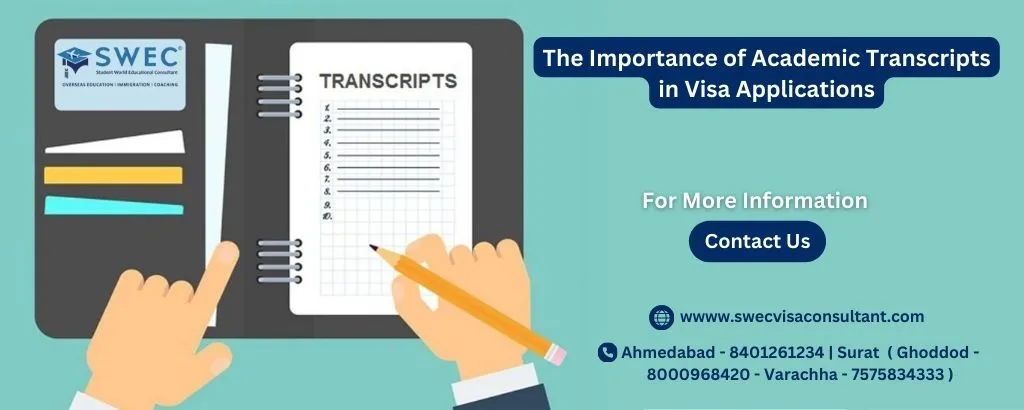Table of Contents
Congratulations on taking the exciting leap towards higher education abroad! To secure your spot at a prestigious foreign university, you’ll need to submit various documents, and one of the most important ones is your academic transcript. But what exactly is an academic transcript, and what does it tell universities about you? Let’s delve deeper and understand everything you need to know!
What is an Academic Transcript?
Imagine your academic transcript as a detailed report card but for your entire educational journey thus far. It’s an official document issued by your university or college that summarizes your academic performance throughout your studies. Think of it as a snapshot of your strengths, weaknesses, and overall academic journey.
People also read: The Role of Language Proficiency in Student Visa Applications
What Information Does an Academic Transcript Typically Include?
- Your Name: This seems like a no-brainer, but your name on the transcript must match exactly with your application documents to avoid any confusion.
- Institution Details: This section provides the name and address of the university or college you attended.
- Board/University Affiliation: This specifies the educational board or university your institution is affiliated with (e.g., CBSE, AICTE).
- Course Details: Here, you’ll find the names of all the academic programs you’ve completed (e.g., Bachelor of Science in Physics).
- Subject-Wise Performance: This is the heart of your transcript, showcasing the grades or marks you’ve received in each subject throughout your program.
- Semester-Wise Breakdown (if applicable): Some transcripts might provide a more granular view by including your performance details for each semester you’ve completed.
- CGPA (if applicable): The Cumulative Grade Point Average (CGPA) is a numerical representation of your overall academic standing throughout your program. It’s calculated by factoring in all your grades.
- Other Achievements (optional): Some transcripts might go beyond just grades and include details of any awards, scholarships, or noteworthy extracurricular activities you participated in during your studies.
Start Your Student Visa Application Today!
Ready to embark on your educational journey abroad? Let our experts guide you through every step of the student visa application process. Click here to get started and ensure a smooth, hassle-free experience!
Types of Academic Transcripts: Understanding the Difference
There are two main types of academic transcripts you might encounter:
- Official Transcript: This is the official and most important document. It’s issued directly by your university or college, bearing the university seal and the registrar’s signature. This is the version you’ll typically need to submit for foreign university applications. Universities often require official transcripts to be sent directly from your institution to ensure authenticity.
- Unofficial Transcript: This is a provisional copy provided by your institution, often available online through a student portal. While it can be helpful for your reference, unofficial transcripts are generally not accepted for university applications.
How to Obtain Your Academic Transcript: A Step-by-Step Guide
Obtaining your academic transcript is usually a straightforward process, but it’s best to plan to avoid any last-minute hiccups:
- Contact your university/college registrar’s office. The registrar’s office handles student records and transcripts. They’ll be able to provide you with specific instructions on how to request your transcript.
- Inquire about the process and fees. There might be a processing fee associated with obtaining your transcript. It’s important to understand the cost upfront.
- Explore online portals (if available). Some institutions offer online portals where you can submit your transcript request electronically. This can be a convenient option if available.
- Complete any required forms. Some universities might require you to fill out a signed application form for your transcript. Make sure you complete this step accurately.
People also read: How to Find Accommodation as an International Student
Important Points to Remember When Submitting Your Transcript
- Ensure your transcript is in English. Most foreign universities require transcripts to be in English. If your transcript is in another language, you’ll need to get it officially translated.
- Verify there are no errors in the information. Double-check your transcript for any typos or discrepancies in the information displayed. Ensure your name, grades, and other details are accurate.
- Check university requirements. Some universities might have specific requirements regarding the format of your transcript (e.g., sealed envelopes). Make sure to check their application guidelines carefully.
Get Expert Help with Your Student Visa Application
Applying for a student visa can be complex. Our professional team is here to help! Schedule a consultation today to receive personalized assistance and increase your chances of a successful application.
Beyond “Transcript”: Different Names for the Same Essential Document
Depending on the country or educational institution, you might encounter various terms used interchangeably with “academic transcript”:
- Mark Sheets
- Transcripts of Record
- Report Cards
- Diploma Supplements
- Cumulative Record Files
- Academic Certificates
Don’t be surprised by these different names; they all essentially serve the same purpose of showcasing your academic history.
Academic Transcript vs. Degree Certificate: Understanding the Distinction
While both academic transcripts and degree certificates are important documents highlighting your educational background, they serve distinct purposes:
- Academic Transcript: This document details your performance throughout your studies. It provides a subject-by-subject breakdown of your grades or marks, semester-wise performance, and your CGPA. It paints a comprehensive picture of your academic journey and achievements.
- Degree Certificate: This document confirms the successful completion of a specific program or degree. It signifies that you’ve met all the academic requirements and are officially awarded a particular qualification (e.g., Bachelor of Arts in Mathematics).
People also read: Top Mistakes to Avoid in Your Student Visa Application
Tips for a Smooth Application Process: Ensure Your Transcript Shines
Here are some valuable tips to ensure your academic transcript helps you stand out in the application process:
- Request your transcripts well in advance of application deadlines. Transcripts can take some time to process, so plan and request them early to avoid any delays in your application submission.
- Double-check university requirements regarding transcript format. As mentioned earlier, some universities might have specific requirements regarding the format of your transcript (e.g., sealed envelopes, and scanned copies for online applications). Make sure your transcript adheres to these guidelines to avoid any issues.
- Keep a scanned copy of your transcript handy for online applications. Many universities offer online application portals. Having a scanned copy of your transcript readily available will expedite the online application process.
Step-by-Step Guidance for Your Student Visa
Navigate the student visa application process with confidence. Our step-by-step guidance ensures you meet all requirements and deadlines. Get in touch with us now for expert assistance.
Conclusion
Your academic transcript plays a crucial role in your journey towards studying abroad. It serves as a window for universities to assess your academic potential and suitability for their programs. By understanding the information it contains, the different types of transcripts, and the process for obtaining them, you’ll be well-equipped to navigate this essential aspect of your application. Remember, a well-prepared transcript that accurately reflects your academic achievements can significantly improve your chances of securing admission to your dream university abroad. So, take the time to understand your transcript, ensure it’s presented accurately, and watch it become your gateway to exciting academic opportunities overseas!
Frequently Asked Questions about Academic Transcripts for Visa and Academic Purposes
Q1. Is a transcript necessary for a visa?
Ans1. Yes, a transcript is often necessary when applying for a visa, especially for study visas, to provide proof of academic qualifications and achievements.
Q2. Why are academic transcripts important?
Ans2. Academic transcripts are important as they provide a detailed record of a student’s academic performance, including courses taken, grades received, and overall GPA.
Q3. What is the purpose of the transcript?
Ans3. The purpose of a transcript is to document a student’s academic history, which is used by educational institutions and employers to assess qualifications and eligibility.
Q4. Can I upload my mark sheet instead of a transcript?
Ans4. Generally, a transcript is preferred over a marksheet because it is a comprehensive record. However, some institutions or visa processes may accept a mark sheet if it contains equivalent information.
Q5. Can we apply abroad without a transcript?
Ans5. No, applying to most educational institutions abroad typically requires a transcript to verify your academic credentials.
Q6. Is a transcript compulsory?
Ans6. Yes, a transcript is compulsory for most academic applications and visa processes to validate your educational background.
Q7. Who benefits from transcripts?
Ans7. Students, educational institutions, employers, and visa officers benefit from transcripts as they provide a reliable record of academic performance.
Q8. When to use a transcript?
Ans8. Transcripts are used when applying for higher education, job applications, and visa processes to provide proof of academic qualifications.
Q9. Why are student academic records important?
Ans9. Student academic records are important as they track progress, help in academic planning, and are required for further education and employment opportunities.
Q10. Are transcripts useful?
Ans10. Yes, transcripts are useful as they provide a detailed academic history that is required for further education, employment, and visa applications.
Q11. What is the goal of a transcript?
Ans11. The goal of a transcript is to provide an accurate and comprehensive record of a student’s academic achievements.
Q12. What is the function of a transcript?
Ans12. The function of a transcript is to document and certify a student’s academic performance and progress over some time.
Q13. Is a transcript certificate important?
Ans13. Yes, a transcript certificate is important as it serves as official documentation of a student’s academic history.
Q14. Do transcripts need to be attested?
Ans14. Yes, in many cases, transcripts need to be attested by the issuing institution to verify their authenticity for visa and application processes.
Q15. What is the difference between a transcript and a certificate?
Ans15. A transcript is a detailed record of academic performance, while a certificate is a document that certifies completion of a course or program.
Q16. Are transcripts required for a visa?
Ans16. Yes, transcripts are often required for visa applications to verify educational qualifications.
Q17. What is meant by an academic transcript?
Ans17. An academic transcript is an official record of a student’s courses, grades, and academic performance issued by an educational institution.
Q18. Do we need transcripts for a Canada study visa?
Ans18. Yes, transcripts are typically required when applying for a Canada study visa to prove academic qualifications.
Q19. What is the difference between an academic transcript and a marksheet?
Ans19. An academic transcript provides a detailed record of all courses and grades over a period, while a marksheet typically lists grades for a single term or exam.
Q20. Are transcripts necessary?
Ans20. Yes, transcripts are necessary for most academic, employment, and visa applications to verify educational history.
Q21. What are the documents required for a transcript?
Ans21. Documents required for a transcript typically include academic records, identification proof, and sometimes a request form from the issuing institution.
Q22. What is the role of a transcript?
Ans22. The role of a transcript is to serve as an official document that provides a detailed record of a student’s academic achievements.
Q23. Who provides transcripts?
Ans23. Transcripts are provided by the educational institutions where the student completed their courses.
Q24. Who writes the transcript?
Ans24. Transcripts are prepared by the academic registrar or relevant office of the educational institution.
Q25. Why are transcripts important?
Ans25. Transcripts are important as they provide a verified record of academic performance, which is essential for further education, employment, and visa applications.
Q26. What are the two types of transcripts?
Ans26. The two types of transcripts are official transcripts (issued directly by the institution) and unofficial transcripts (usually accessed by the student).
Q27. What is a transcript and what is its purpose?
Ans27. A transcript is an official record of a student’s academic performance. Its purpose is to certify and document the courses taken, grades received, and overall academic achievements.
Q28. Why are academic papers important?
Ans28. Academic papers are important as they contribute to the body of knowledge in a field, demonstrate a student’s research and writing skills, and are often required for academic and professional advancement.
Q29. Why are records so important?
Ans29. Records are important as they provide a documented history that is essential for verifying qualifications, tracking progress, and making informed decisions.
Q30. Why are school records important and necessary?
Ans30. School records are important and necessary as they track a student’s academic journey, help in educational planning, and are required for further education and employment opportunities.
Q31. What are the disadvantages of transcripts?
Ans31. Disadvantages of transcripts may include the time and cost associated with obtaining them and potential delays in processing.
Q32. Are transcripts valid?
Ans32. Yes, transcripts are valid documents that officially record a student’s academic history.
Q33. How many copies of transcripts are required?
Ans33. The number of transcript copies required varies depending on the application requirements of the institution or visa process.
Q34. What is the main purpose of transcription?
Ans34. The main purpose of transcription is to create a written record of spoken or recorded information.
Q35. What makes a good transcript?
Ans35. A good transcript is accurate, comprehensive, clearly formatted, and officially certified by the issuing institution.
Q36. What does a transcript need?
Ans36. A transcript needs to include the student’s courses, grades, credits earned, and academic terms, and be authenticated by the institution.
Q37. Who uses transcripts?
Ans37. Transcripts are used by students, educational institutions, employers, and visa officers to verify academic qualifications and performance.
Q38. What are the 4 steps of transcription? \
Ans38. The 4 steps of transcription typically include preparation, listening, writing, and reviewing for accuracy.
Q39. How should a transcript be?
Ans39. A transcript should be clear, accurate, comprehensive, and officially certified.
Q40. What is the meaning of a transcript in a visa application?
Ans40. In a visa application, a transcript is a document that provides a detailed record of a student’s academic performance to verify their qualifications.
Q41. Can I submit a marksheet instead of a transcript?
Ans41. Generally, a transcript is preferred, but some processes may accept a marksheet if it contains equivalent detailed information.
Q42. Is a transcript necessary for a job application?
Ans42. For many job applications, especially those requiring specific qualifications, a transcript may be necessary to verify academic history.
Q43. Why are transcripts needed?
Ans43. Transcripts are needed to provide a verified record of a student’s academic achievements for further education, employment, and visa applications.
Q44. What documents are needed for transcripts?
Ans44. Documents needed for transcripts usually include academic records, identification proof, and a transcript request form.
Q45. Is there any validity for transcripts?
Ans45. Transcripts themselves do not expire, but the information they contain must be accurate and relevant for the purpose they are being used.
Q46. Is a transcript certificate important?
Ans46. Yes, a transcript certificate is important as it serves as an official record of a student’s academic performance.
Q47. Are consolidated mark sheets and transcripts the same?
Ans47. Consolidated mark sheets and transcripts are similar, but transcripts typically provide a more detailed and comprehensive record of academic performance.
Q48. How does the embassy verify educational documents?
Ans48. Embassies verify educational documents through authentication processes, including attestation by issuing institutions and sometimes contacting the institutions directly.
Q49. Do transcripts need to be attested?
Ans49. Yes, transcripts often need to be attested by the issuing institution or relevant authorities to verify their authenticity.
Q50. What is the difference between a transfer certificate and a transcript?
Ans50. A transfer certificate is a document that allows a student to transfer from one institution to another, while a transcript is a detailed record of academic performance.
Q51. What is the meaning of academic transcription?
Ans51. Academic transcription refers to the process of converting spoken academic content, such as lectures or discussions, into a written format. This helps students and educators to review and study academic material more effectively.
Q52. How many transcripts are required for Canada?
Ans52. The number of transcripts required for Canada varies based on the specific educational institution’s requirements. Typically, you may need to provide multiple copies directly from your previous educational institutions.
Q53. What is the difference between an academic transcript and an official transcript?
Ans53. An academic transcript and an official transcript both provide a record of academic achievements, but an official transcript is usually issued directly by the institution and may include additional authentication or signatures.
Q54. What is the importance of a transcript certificate?
Ans54. A transcript certificate is important as it serves as an official validation of a student’s academic achievements, providing credibility and authenticity to the academic record.
Q55. Are transcripts and mark sheets the same?
Ans55. No, transcripts and mark sheets are different. Transcripts provide a comprehensive record of all courses taken, grades received, and overall academic performance over time, whereas mark sheets typically document grades for individual subjects or terms.
Q56. How should transcripts be written?
Ans56. Transcripts should be written clearly and accurately, including details such as course titles, grades, credits earned, and the institution’s official seal or signature for authentication.
Q57. How are transcripts prepared?
Ans57. Transcripts are prepared by the academic registrar or administrative office of the educational institution where the student studied. They compile and certify the student’s academic record for official purposes.
Q58. What is the significance of a transcript?
Ans58. The significance of a transcript lies in its ability to provide an official and detailed record of a student’s academic achievements, which is crucial for academic progression, job applications, and visa processes.
Q59. What is the function of a transcript?
Ans59. The function of a transcript is to document and certify a student’s academic history, including courses taken, grades earned, credits obtained, and overall academic performance.
Q60. What is a transcript and what is its purpose?
Ans60. A transcript is an official document that serves the purpose of providing a detailed and verified record of a student’s academic achievements, necessary for educational, employment, and visa-related applications.






